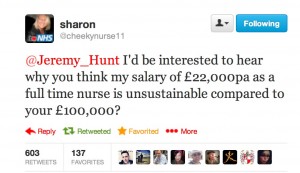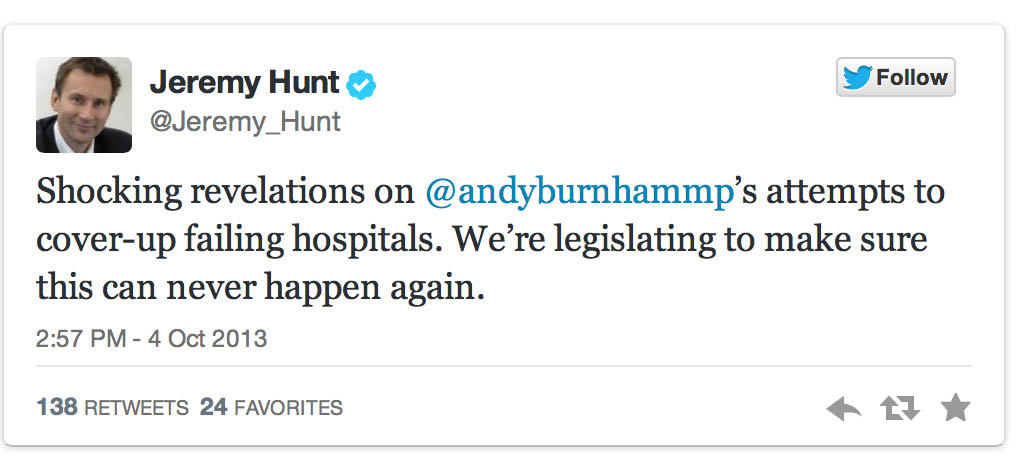Home » Posts tagged 'Jacky Davis'
Tag Archives: Jacky Davis
Review: A film by Peter Bach called “Sell off: the abolition of your NHS”
For health reasons, I don’t drink. After a six week coma due to meningitis at the Royal Free, which left me disabled, I have a massively personal reason why I am grateful to the NHS.
This one event taught me that anything can happen at any time. Last night, I went along to a private viewing of “Sell-off: The abolition of your NHS” at the BAFTA in Piccadilly. Not having drunk for alcohol for seven years, I don’t feel any particular urge to drink. In fact, I quite liked the atmosphere of their bar in the complete absence of alcohol. I quite like diet Coke.
The bar made me think of New York in fact in a brief period of escapism from a wet and miserable evening in March in Central London.
While I was sat thinking about how unusual it was for me to go to bars these days, I heard a voice I recognised. Then I suddenly twigged who it was – Tamasin Cave, Director of Spinwatch, was talking with someone about the “Lobbying Tour”. I said as politely as I could to her that the YouTube video of her tour is very famous.
“Famous for a certain group of people perhaps!”, she replied.
Peter Bach’s film, which is currently in an uncut stage, is exquisitely done. It covers all the points you’d expect in a documentary about a piece of legislation which was railroaded in without meaningful discussion. The frames of those people interviewed flow nicely, and the resulting narrative is coherent. I know this particular narrative extremely well, but there were some points for seasoned viewers like me too.
The views on the NHS captured in Bach’s film impressively don’t sound like one spiteful rant, though, which is the really clever aspect of the film. The film is possibly best described as a clear fly-on-the-wall documentary where patients and doctors clearly feel utterly disenfranchised from the NHS. This is of course in total contrast to the humanistic foundations of the NHS in the 1940s.
Peter Bach, the filmmaker, talks about how he went to a basement in Earls Court, to say how “he was bombarded by a litany of complaints” from a group of people concerned about the running of the NHS. Whilst Max Keiser argues in his interview with Peter Bach ‘you can’t put a price tag on the NHS’ (see below), you unfortunately can put a price tag on the costs to make this film. If you’d like to support this very important initiative of public interest, please go to this ‘StartJoin’ website for crowdfunding.
If the film set out to achieve a fascinating overview of the issues engulfing the NHS, it certainly did that. The concern, of course, is that this film ends up ‘preaching to the converted’, and it contains still a mystery why the mainstream media seem reluctant to discuss the running of the NHS. Supporters of NHS privatisation have argued that it doesn’t matter who runs the NHS as long as it’s run well and free at the point of use. Supporters of the NHS privatisation therefore tend to argue that the public do not want to have this debate. Conversely, people who support a NHS which is state-run obviously argue, instead, that this debate does matter; and the film indeed posits very good clear arguments why the market does not work in the NHS. The film clearly states that competition doesn’t work effectively for the NHS; measuring all the activity in the NHS itself wastes resources (going up from about 2% of the budget to 30%). The youthful and inspiring Dr Clive Peedell was spitting bullets at the encroachment of the market – and of course is right.
The film flows effortlessly, for example, from an excellent description bogus nature of running the finances of a hospital, compared to a household budget, by Dr Bob Gill to a mention of indexation in the private finance initiative (PFI) by Prof Allyson Pollock. Pollock is clearly somebody who should have been listened to much earlier. At least Pollock is completely vindicated. Whilst politicians of all shades have argued the beneficial effects of PFI, the concerns are brilliantly enuniciated by Pollock. An on-running theme of this film evidently is that it’s not the case that this is a fait accompli of the corporatisation of the NHS, though time is running out now. Something can be done about PFI contracts (and may require attention due to the repercussions of PFI on freedom of information requests concerning safe staffing). It might be late in the day, but it wouldn’t be too late for a candid repentance. Likewise, the public lawyer states correctly the Health and Social Care Act (2012), which led to the £2.4 million ‘reforms’, can be repealed. And it would take one Bill to restore of the duty of the Secretary of State for Health in running the NHS.
Both Dr Jacky Davis and Dr Louise Irvine speak brilliantly in the film on the issues of the ‘democratic deficit’. Given that the mainstream media have continued to ignore the changes in the NHS traditionally, their opinions are clearly a polite (not desperate) plea for members of the general public to become involved. Meanwhile, in the film itself, Dr Lucy Reynolds, who clearly has many interesting insights about cross-jurisdictional aspects of healthcare systems, describes how she left a U.K. where the N.H.S. was respected to one where the N.H.S. was pilloried on a daily basis. I also had a nice chance to chat with Dr Davis and Dr Irvine before the film, and with Dr Jonathon Tomlinson afterwards.
As I left the theatre and the BAFTA building, I caught sight of Lord Owen. On seeing Owen, I was reminded of an interview by the late Tony Benn. Benn’s remarks about how the SDP had been partly launched as a reaction to the inadequacy of Labour still irritate some. In that particular interview these remarks preceded a diatribe also by Benn about how it wasn’t the Left’s fault that Labour had been unelectable. Bach’s film brilliantly doesn’t shovel the blame at the doorstep of any one political party, though clearly no Government (especially this one) comes out of it particularly well.
Many seasoned commentators have learnt that there is a consistent pattern of unsafe practice, where people have not been empowered to speak out safely. I am very glad that Bach’s film approached this intelligently, in a constructive and altogether non-vindictive manner. Peter Brambleby talks with much dignity about how his concerns well known elsewhere fell on deaf ears. Dr Kim Holt also talks about the well known phenomenon of how whistleblowers are first ostracised before being silenced and finally excluded.
The argument that Foundation Trusts, such as Mid Staffs, allegedly made staff cuts endangering patient safety in the rush to meet financial targets to gain Foundation Trust status is elegantly made. Meanwhile, the 6Cs, and indeed lack of minimum staffing, many believe, do not protect against the basic threat of unsafe staffing on the delivery of NHS care.
In a weird way, the film is as iconic as the best of them such as “Breakfast at Tiffany’s”, despite being in a completely different genre. I think it’s inevitable that this film will connect with people in a way which reflects the subject-matter being more significant than the usual party-politics. If the problem was explaining the complex narrative of the failures of NHS policy in a succinct, understandable manner, Bach has just achieved a First with Distinction. It’s a remarkable piece of work, which, whether you are particularly interested in the NHS or not, deserves to be widely seen; and indeed deserves the highest official praise.
Jeremy Hunt fiddles while Rome or A&E burns, and a smear campaign continues
There is nothing as inevitable as death and taxes, apart from Channel 4 ‘scoops’ on the NHS and Conservative smear campaigns against Andy Burnham.
Ed Miliband’s narrative in the last few weeks or so has been about ‘facing up to bullies’. In this context, it is hard to imagine that he is going to reshuffle Andy Burnham MP out of Health. It is well known that Burnham knows this brief backwards, and is considering how to throw forward the issues about NHS financing with introducing innovative ‘whole person care’ to remould the design of primary and secondary care services.
You would have thought that Channel 4 and the Conservative Party would be more interested ‘in the national interest’ about the fact that cuts in the NHS are leading to over-pruned staff, and this can risk patient care. You would have thought that they would have been interested in a debate about a £3bn top-down reorganisation and £2bn ‘efficiency savings’ pumped back to the Treasury (not frontline care). This issue of pay unsurprisingly has demoralised NHS staff in comparison to NHS managers who have received a formidable pay increase.
This has struck a raw nerve with some people especially:
It is all part of a relentless campaign of attacks on the NHS, in the name of ‘investigative journalism’ where the evidence is either missing or distorted to suit the purposes of the broadcaster.
Dr Jacky Davis said of the previous Channel 4 programme, not the report last night, on the “Our NHS” blog:
On September 11th Channel 4 news broadcast a lengthy piece on the NHS, ominously entitled ‘Death on the Wards’. It presented new figures from Professor Sir Brian Jarman about alleged high mortality rates in UK hospitals. There was a clear intention to shock the viewers. The ‘s’ word was repeatedly used by the two presenters and after describing Jarman’s figures as ‘absolutely shocking’ Victoria Macdonald then attempted to put the words into the mouth of Sir Bruce Keogh (Medical Director of the English NHS) when she asked him ‘When you saw those data were you shocked?’ To his credit Sir Bruce sensibly claimed that he needed ‘to think about it’, a basic precaution that the broadcasters would have done well to emulate.
The piece was peppered with worrying claims including one that ‘the NHS is fundamentally failing’ along with claims about patients’ likelihood of dying in a UK hospital as opposed to one in the USA. Finally the presenter compared the average UK hospital with the Mayo Clinic in the US (one of the world’s most prestigious hospitals with an annual revenue of over $8 billion) without any suggestion that comparing a Mini to a Rolls Royce might be ingenuous at best and negligently misleading at worst. This was followed by a panel discussion involving Professor Jarman, Tory MP Charlotte Leslie and [Corrected: this should have read a 'a representative'] of Cure the NHS which was set up after the Mid Staffs disaster. Not a single person to speak up for the NHS or question the data.
Instead, all of this gives an appearance of a message which is being controlled very strongly from Conservative Central Office, though media outlets will of course strongly deny this. Many viewers are sick of reporting of this which is either inaccurate or misses out half of the relevant evidence, with the obligatory appearance from Brian Jarman whose research has been strongly criticised in the medical press. It is common knowledge that the BBC is accused to have devoted hardly any time to accurate, complete and balanced reporting of the acceleration in NHS privatisation, as shown in minimal coverage of a rally in Manchester recently which had attracted 60,000 people.
And yet the true facts are disgusting as to what has actually happened to acute care under this Government’s watch. The number of A&E units missing targets has trebled in a year, as the Government was accused of presiding over an unprecedented “summer A&E crisis”. Between July and September, 39 departments failed to meet the Government’s key target of seeing 95 per cent of patients within four hours, new quarterly figures from NHS England show. Last year only 14 units missed the target for the same period.
It is reported that the Shadow (and former) Health Secretary “Andy Burnham is facing calls to quit after claims he tried to “block” the publication of a devastating report into hospital neglect before the last election”, but in fact these “calls” have come from Tory MPs and a very unpleasant media campaign from certain recurrent protagonists in the media. Nothing would give these people greater delight than ‘gaining a scalp’ when they should be sorting out the mess of service provision of acute medical care in England.
It is also reported that, “Britain’s most powerful civil servant Cabinet Secretary Sir Jeremy Heywood was last night examining whether he needs to set up a Whitehall investigation into whether civil servants breached their code of conduct.”
However this is only because he has been written to. If Heywood has read the letter, he will indeed be considering this issue. He has not decided to investigate this issue yet.
A set of emails were released after Conservative MP Stephen Barclay made a Freedom of Information request to the Care Quality Commission, relating to the Basildon and Thurrock University Hospitals NHS Foundation Trust. Barclay has campaigned on this issue vocally in the past (see for example his article in the Telegraph “The only way to cure the NHS is to change the way we police failures”). The terminology of “cure the NHS” is also striking given the name of the campaigning group “Cure the NHS“, the leader of which was indeed cited by Jeremy Hunt in parliament in one of his numerous speeches demoralising current staff in the NHS. This patient campaigning group – like Channel 4 and the BBC – has also been keen in the past to quote Brian Jarman’s statistics which have received widespread criticism in the academic press. Mid Staffs Foundation Trust is now set to ‘dissolve’. All the sensationalist bravura has actually achieved absolutely nothing in itself.
The awful spectacle of this whole political debacle is that in English health policy this is all incredibly important. Phil Hammond (GP not Secretary of State for Defence) and Heather Wood have both been instrumental in bringing to the fore what had tragically happened to this Trust, and what does need to be remedied in parts of the NHS, for example.
Isabel Hardman, in a narrative which now sounds like intensely boring stuck record, reports that:
The knives are clearly out for the Shadow Health Secretary – and if MPs are calling for him to resign just before a reshuffle, it suggests they want to leave him wounded in the run-up to the 2015 election, rather than leave his post.”
But reporting malicious gossip rather than English health policy is clearly not going to benefit the patients of NHS England.
The problem, is that the central claim – that Burnham himself personally engaged in a ‘cover up’ – might well be potentially legally defamatory on the balance of probabilities under English law.
On the information publicly provided by Andy Burnham in a ‘Labour List’ post, provided as he was totally fed up with the gun-ho nature of the smears, it appears that there is prima facie no evidence of a cover-up. There is only evidence that there was anger at CQC/DH protocols not being observed. (THIS IS NOT AN OFFICIAL LEGAL OPINION).
Indeed, there are wider issues about the legitimacy of the need to publish potentially defamatory information in such a hurry, ahead of a reshuffle, under the “Reynolds Criteria”.
But there is currently a long-running dispute in the law whether such comments should be covered by defences such as legal parliamentary privilege. Hence Burnham’s litigation experts are asking Jeremy Hunt to ‘put it to proof‘.
A Conservative health spokeswoman, and countless people in the past ad nauseam, is reported to have said there was “overwhelming evidence that Labour ministers leant on the quality watchdog to tone down and cover up NHS failure for political purposes”.
In the absence of knowing what the civil service were ‘up to’ at the time (and many of these staff might have moved on) at the Department of Health, it is actually impossible to make this claim.
The irony is that, when the PM addressed Parliament originally over the Francis Report into Mid Staffs, he said categorically that he ‘did not want scapegoats’, despite patient campaigners having a hit list or ‘wall of shame’ of those people which they wished retributive justice to be administered on.
In his centrepiece Conservative party conference speech this week, Hunt lambasted Burnham for “covering up” poor care during his time as health secretary yet again despite the fact these smear tactics have failed to impact any polling on the NHS for Labour and the Conservatives. And in the meantime performance of A&E actually has been reported to deteriorate.
Hunt repeated the narrative of Channel 4, in regurgitating Jarman’s statistics which many have panned in the academic press, and ratcheting up the pace on Twitter. It has long been appreciated he does his own tweets, in the same way that Andy Burnham does.
Burnham insisted that those “damaging emails” showed only that he was concerned that rules about disclosure had been broken.
In a furious open letter, Burnham wrote:
It is impossible to see how you can claim this mounted to a cover-up. I therefore ask you, by the end of today, to provide me with evidence to substantiate your assertion.If you fail to provide such evidence, I will require a full retraction and public apology. If that is not forthcoming I will consider further action.
However, Baroness Young, who is now chief executive of Diabetes UK, last week was at the Conservative Party conference in Manchester, and responded to Mr Hunt’s claim at a debate held by the think tank “Reform”:
BY:
“I just want to put the record straight because within your speech today, Jeremy, particularly the press release that accompanied it, you continued to misrepresent my evidence to the Francis inquiry and to misrepresent that the situation the letter from Andy Burnham to me and I really am very angry about it.
“I have already written to you and the prime minister previously to point out the fact that the way that you are abusing my evidence to the Francis inquiry in a partial manner misrepresents entirely the situation that existed at that time.
“I think it’s unfortunate that you’ve used a partial quote from me to imply that the CQC was pressurised into concealing this because it simply was not the case. If I was pressurised at all either politicians or by civil servants it was about the process by which CQC went about its regulatory work. At no point was I ever asked to or indeed did tone down the evidence. I really do find it very unsatisfactory on a number of counts that this continues to be pedalled in public and in newspapers. I’m not sure what it is that you don’t understand about me saying I was never put under pressure to subdue the findings of the CQC as a regulator.
“The most distressing part of this is that we are constantly harking back to what the political classes were doing rather than looking forward and giving CQC and others involved in healthcare as much support as possible in improving and building on the problems of health systems rather than constantly undermining the work that was done in the past.”
JH: “I really do need to respond to that. Do you have the words that you said under oath to the Francis inquiry?”
BY: “I have a full copy of the Francis inquiry.”
JH: “Will you read out the words you said to Francis inquiry.”
…
BY: “I was paraphrasing the best bit about the pressure coming from civil servants rather than ministers and I’m now quoting ‘it was primarily because what we wanted to do (ie our regulatory processes) not so much what we wanted to say because I don’t think we were really under a lot of pressure not to say things’. That cannot be clearer, that was from my Francis evidence a long, long time before this hoo-ha arose.”
JH: “First of all I think it was deeply wrong that you should have been under pressure from civil servants, who are under the orders of ministers, in terms of what you do in connection to the whistleblowing issue.
None of this is helping with the morale at the current situation in Staffordshire, especially with regards to recruiting excellent staff to work in their units. Mid Staffs and surrounding areas have also in the meantime embarked on successful programmes of cultural change, and therefore this slamming of Mid Staffs in the media can only be seen for petty nasty electoral reasons. And, most significantly, many people in Staffs themselves are now very upset. It is said that Sir Hugo Mascie Taylor, involved in the current Staffs reconfiguration, has repeatedly made the point that the key reason for the propsals to change services here are because of the reputational damage inflicted on Mid Staffs, and the way this has made recruitment more difficult.
It also very much emerges that, if there is anything to investigate, it is the civil service culture of the Department of Health. And meanwhile none of this helps the current crisis in A&E. Despite the government’s pledge to protect frontline services with real-terms increases in funding, Monitor, the NHS watchdog, has proposed that in 2014-15 hospitals should be paid 4% less for operations than they were the previous year. While hospitals were braced for a cut of about £1bn in funding, the Foundation Trust Network, which represents all 160 hospital trusts in England, calculates that Monitor is now asking for another £500m in savings – roughly £3m from each trust.
Chris Hopson, chief executive of the Foundation Trust Network, said cuts to frontline services would be deeper than expected and questioned whether the NHS could invest in much needed changes to the way hospital services work, as had been recommended by the Francis report into failings at Mid Staffordshire NHS Trust. The need to correct funding shortfalls was also identified in the Keogh report on mortality, recently, in 14 NHS Trusts. Indeed, countless studies have shown a link between unsafe levels of staffing and poor patient safety, and this is the real debate. He is quoted as follows:
The level of efficiency savings the NHS has delivered over the last three years is unprecedented, but this level of performance cannot be sustained year on year till 2021. We need a reality check here – in the end you get what you pay for, and trusts can’t perform miracles out of thin air.
And actual staff are totally sick of it all now.
The head of health at the union Unite, Rachel Maskell, is reported to have said:
Jeremy Hunt is responsible for either undermining the Treasury position or trying to act in an even more draconian way than the Treasury with regards to staff who work across the NHS. He blames the staff on a regular basis; now he wants to further cut their terms and conditions.
Mark Porter, chairman of the BMA Council, is also reported to have said:
Doctors fully recognise the economic constraints the NHS is facing, but for the government to imply that unless NHS staff endure what is effectively another year of pay cuts they will put patient safety at risk is insulting at best, given doctors are working harder than ever before and have borne the brunt of the government’s efficiency drive.
Correction: Perhaps some other things are inevitable after all. The NHS ‘efficiency drive’ will continue, the smear campaign against Andy Burnham will continue, the malaise over what is happening to the NHS will continue for a bit, Brian Jarman’s methodologically problematic weak statistics will continue to get quoted on the BBC and Channel 4.
But – in a latest twist to the story, Andy Burnham’s (Labour) lawyers are completing the pre-action protocol for civil litigation against Jeremy Hunt on the law of the tort of defamation under English law.
If this all proceeds to formal legal proceedings, I will not be able to make any comment on it.
And Andy Burnham will still be in a job.





